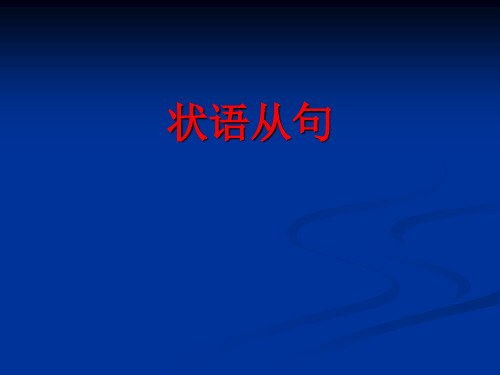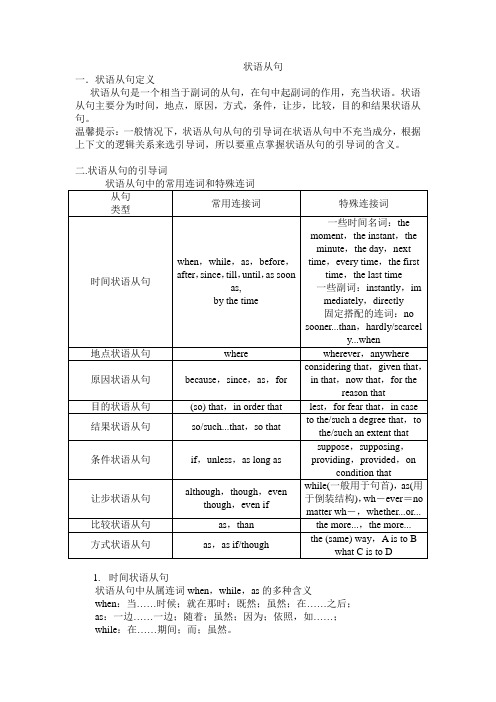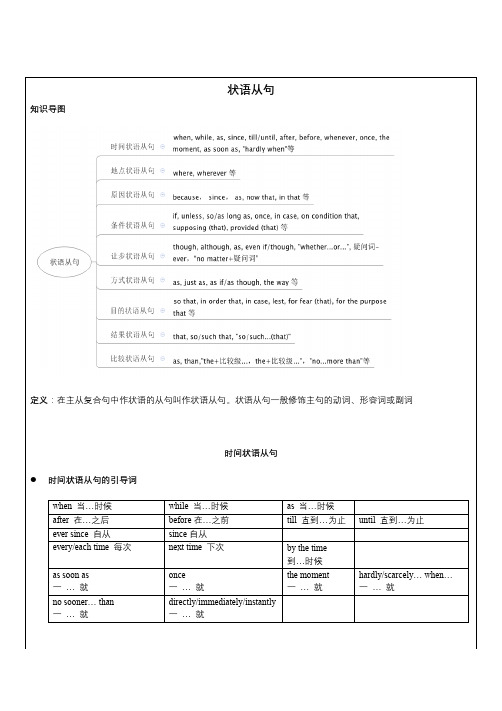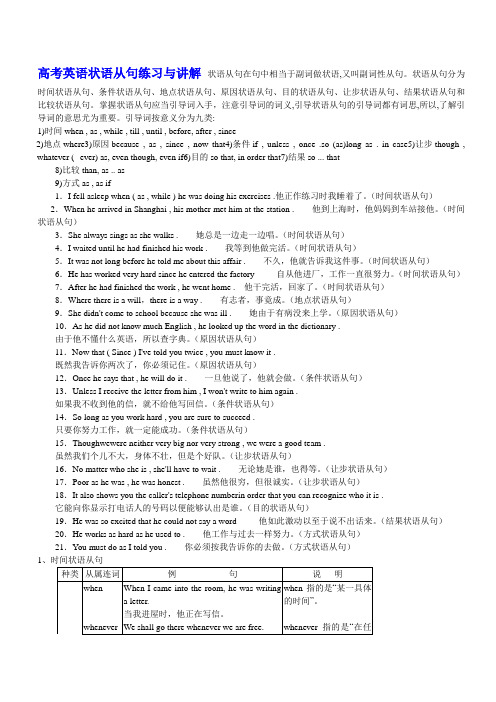高中英语状语从句讲解
高中英语语法课件_状语从句 (共42张PPT)

whether…or…
whether…or…引导的让步状语从句: △ 这种从句也称“选择条件-让步状语从句”,可位于 主句之前或之后,如: 1.Whether you like it or not, you’ll have to do it. 2. We hold that all countries, (whether they are) big or small, (whether they are) rich or poor, should be equal. 3. Whether it rains or snows, I will go tonight. 5. She had to go, whether or not she wanted it.
2) 一些表示时间的名词词组也可引
导时间状语从句。如:the moment, the minute, (一…就)next time (下次), every/each time (每 次)。 e.g. The moment he comes, I will tell him.
4) as soon as, immediately, directly, instantly 等副词也可引 导状语从句。表示“一…… 就……”。
.
1. I was so familiar with him that I recognized his voice ______ I picked up the phone. A. while B. after C. In case D. the minute 2. How long do you think it will take _______ our product becomes popular with the consumers? A. when B. until C. before D. since
高中英语语法总结之状语从句(共37张ppt)

• Difficulties are nothing if we are not afraid of them.如果我们不怕困难,困难就算不了什 么了。
• We shall go there tomorrow unless it rains. = We shall go there tomorrow if it doesn’t rain. 除非下雨,我们明天就去那里。
• Every time I travelled by boat, I got seasick.我 每次乘船都晕船。
• The moment I heard the song, I felt cheerful. 我一听到这首歌,就感到很愉快。
• Next time you come ,you’ll see him.下次你来 的时候,就会见到他。
• We were not tired though (although) we had worked all day.虽然我们干了一天活,但并 不累。
• (2)even if, even though(even if 和even though的意思为“即使”“纵使”有退一步 设想的意味,多用于书面语中)。
• 5、结果状语从句:
• (1)so that,so…that(so that前有逗号为 结果状语从句,so…that的so后面跟形容词 或副词)。
• We turned up the radio, so that everyone heard the news.我们把收音机的音量放大, 大家都听到了新闻。
• Seeing (that) he was badly ill, we sent for the doctor.鉴于他病情严重,我们派人去请医生 去了。
高中英语状语从句

状语从句一.状语从句定义状语从句是一个相当于副词的从句,在句中起副词的作用,充当状语。
状语从句主要分为时间,地点,原因,方式,条件,让步,比较,目的和结果状语从句。
温馨提示:一般情况下,状语从句从句的引导词在状语从句中不充当成分,根据上下文的逻辑关系来选引导词,所以要重点掌握状语从句的引导词的含义。
二.状语从句的引导词一些时间名词:themoment,the instant,theminute,the day,nexttime,every time,the firsttime,the last time一些副词:instantly,immediately,directly固定搭配的连词:nosooner...than,hardly/scarcely...when1.时间状语从句状语从句中从属连词when,while,as的多种含义when:当……时候;就在那时;既然;虽然;在……之后;as:一边……一边;随着;虽然;因为;依照,如……;while:在……期间;而;虽然。
用when,while和as填空:①He will take my place ________ I am away.②I was having my lunch ________ the fire alarm went off.③________ you have finished your work,you may have a rest.④________ he swam,he cried for help.⑤________ the Internet is of great help,I don't think it good to spend too much time on it.【答案】①while②when③When④As⑤Whilebefore的用法注意判断before在状语从句中的含义:才;就;趁……没有;还没来得及;宁可……也不;不知不觉。
高中英语状语从句讲解与练习

高中英语状语从句讲解与练习高中英语状语从句一、时间状语从句1、when的用法(1)when既可引导一个持续性动作,也可引导一个短暂性动作,可用于表示主句和从句动作同时发生或从句动作先于主句动作,有时还可表示从句动作后于主句,意为“当……时候”。
(2)when在beabouttodo……when……,bedoing……when……,haddone……when……,beonone’sway……when……,beonthepointofdoing…when……等结构中作“那时突然”讲。
(3)when“既然、鉴于;尽管,虽然(位于主句之后);如果”2、while的用法(1)则表示“当……时候”,鼓励的动作必须就是延续性的。
(2)用做同列连词,则表示相对关系“然而”。
(3)引导让步状语从句,相当于although,意为“虽然”,位于主句前。
(4)引导条件状语从句,相当于as/solongas,意为“只要”。
3、as的用法(1)则表示“当……时候”,特别强调同时出现,不所指先后。
(2)说明两种正在发展或变化的情况,表示“随着”,表示时间的推移。
(3)表示“一边……一边……”(4)强调两个动作紧接着发生。
(5)表示“虽然,尽管”(6)其他含义“正像,正如”,“做为”,“由于,因为”。
4、before的用法(1)一般意为“在……之前”“……才”,“……就”“还没有……”“免得”“不知不觉”“宁可,宁愿”,“否则,要不然”。
(2)itwillbe/was时间段before通常现在时/通常过去时。
在肯定句中,意为“多长时间之后才”;在否定句中,意为“用没法多长时间就”。
5、until和till(1)与肯定句连用,必须是延续性动词。
(2)与否定句属格,必须不为延续性动词,则表示“直至……才,在……之前不……”。
特别注意:notuntil可以用作特别强调句和倒装句强调句:itis/wasnotuntil…that…倒装句:notuntil放句首时,主句要部分倒装。
高中英语--状语从句专题讲解(详细)

注:
“no sooner…than…”,“hardly…when…”引导时间状语从句时,主句用过去完成时,从句用一般过去时。此外,当把no sooner, hardly/scarcely提到句首时,主句用部分倒装。
as意为“随着,一边…,一边…”,常有以下用法:
a)用于表示两个动作同时或者几乎同时发生。
b)表示两个发展变化中的情况。
c)表示在某事发生的过程中另外一件事发生。
d)表示随着短暂动作的发生,另一动作立刻发生。
before和after引导的时间状语从句
before意为“在…之前”,表示主句动作发生在从句动作之前。
=I hardly told him the news when he stopped listening.
地点状语从句
地点状语从句的引导词有when和wherever。
where, wherever指具体地点时,从句可用于主句之前或之后;
where, wherever表示抽象概念的含义时,从句需放在主句前。
When hehad finishedhis homework, hetooka short rest.(先发生+后发生)
When Igotto the airport, the guesthad left.(后发生+先发生)
注:
when还可表示原因,意为“既然”,引导原因状语从句;也可以用作并列连词,意为“就在那时”,常构成如下结构:
A number of high buildings have arisen where there was nothing a year ago but ruins.(where表示具体地点)
高中英语状语从句详细讲解及例句

高考英语状语从句练习与讲解状语从句在句中相当于副词做状语,又叫副词性从句。
状语从句分为时间状语从句、条件状语从句、地点状语从句、原因状语从句、目的状语从句、让步状语从句、结果状语从句和比较状语从句。
掌握状语从句应当引导词入手,注意引导词的词义,引导状语从句的引导词都有词思,所以,了解引导词的意思尤为重要。
引导词按意义分为九类:1)时间when , as , while , till , until , before, after , since2)地点where3)原因because , as , since , now that4)条件if , unless , once .so (as)long as . in case5)让步though , whatever (--ever) as, even though, even if6)目的so that, in order that7)结果so ... that8)比较than, as .. as9)方式as , as if1.I fell asleep when ( as , while ) he was doing his exercises .他正作练习时我睡着了。
(时间状语从句)2.When he arrived in Shanghai , his mother met him at the station .他到上海时,他妈妈到车站接他。
(时间状语从句)3.She always sings as she walks .她总是一边走一边唱。
(时间状语从句)4.I waited until he had finished his work .我等到他做完活。
(时间状语从句)5.It was not long before he told me about this affair .不久,他就告诉我这件事。
(时间状语从句)6.He has worked very hard since he entered the factory 自从他进厂,工作一直很努力。
高中英语状语从句 详解
When ---当……时候, 通常指 某一特定的时间点,主句与从 句的动作同时发生。
When I opened the window, I saw him come up.
When I have time , I will go to see you. (主将从现)
When --- 正在…的时候,突然…。 在翻译的时候,when 可以译成 没想到或突然。 I was walking along the street , when I met him. I was about to fall asleep when my sister came in.
The captain has traveled almost everywhere in the world since he became a pilot.
It is just a week since we arrived here.
(It is /has been… since…是常用 句型)
什么能做状语?
• 1 副词 • 2 介词短语 :he traveled in Africa for six weeks. • 3 形容词: my uncle stood there, died.
he finally came back, tired and cold. • 4 with复合结构: with a lot of work to do, I think I
As soon as --- 一……就……
Jack went to school as soon as he got well.
I’ll ring you up as soon as I get an answer from him.
高中英语状语从句用法详解文档
高中英语状语从句用法详解文档四维教育状语从句用法详解在主从复合句中修饰主句的动词、形容词、副词等的从句叫状语从句。
一般可分为:时间状语从句、地点状语从句、原因状语从句、目的状语从句、结果状语从句、条件状语从句、让步状语从句、比较状语从句、方式状语从句。
I时间状语从句:起时间状语作用的从句。
(时间状语从句位置灵活,可以在句首,也可在句末)常用来引导时间状语从句的引导词有:when, while, as, after, before,until/till, since, as soon as, immediately, the moment, every time, whenever等。
1.when, while, asI was very happy when I heard from you.收到你的时我非常兴奋。
When you deal with them, you should be cautious.跟他们打交道时,你应当郑重。
when指导时间状语从句中的谓语动词能够用非延续性动词,也可用延续性动词。
When I was young, I went to town myself.当我还年青时,我本人独自去城里。
(延续性动词)When I lived in country, I used to carry some water for him.我住在农村时,常常为他担水。
(延续性动词)When he received the letter, he'll tell us.当他接到后,他会告诉我们的。
(非延续性动词)When the fire broke out, all the students were sleeping soundly.火灾发生时,所有的学生正在熟睡。
(非延续性动词)注意:当when引导的时间状语从句为系表结构,而且其主语和主句的主语一致,其表语又是一个名词时,就能够用由as指导的省略句来代替when指导的从句。
高中英语状语从句详解
状语从句一:状语从句的定义、功能、分类定义:在复合句中作状语的从句功能:状语从句在主从复合句中修饰主句中的动词,形容词或副词,或整个主句分类:按意义可分为时间、地点、原因、目的、结果、条件、方式、比较、让步等状语从句。
位置:从句的位置放在句首,也可放在句末。
放在句首时,从句后面常用一个逗号,放在句末时,从句前一般不用逗号。
二:考点与难点1、各种从属连词的含义及用法比较;2、no matter wh- 与wh-ever 引导的从句的区别;3、状语从句的时态问题;4、状语从句倒装及省略;5、状语从句与其它从句的区别。
三:九种常见状语从句用法1. 时间状语从句引导时间状语从句的从属连词1).基本类:before、after、when、while、as、since、till、until、once, as soon as, etc.2). 名词类the moment ,the minute, the second, the instant,etc. (一…就…); every time, each time, the last time, the first time, the day, the year, the morning etc.3). 副词类:immediately, directly, instantly, etc. (一...就...)4).句型类:no sooner…than…, hardly/scarcely…when…, etc. (一…就…)注意:1. when, as, whileWhen ①when表示时间点时,从句中用短暂性动词;表示时间段时,用持续性动词。
Eg:. When they were still talking and laughing, the teacher came in. (when表示段时间)2). He waved a hello when he saw her.(when表示点时间)②. 可用作并列连词,其意义为“这时,突然”,相当于and then suddenly。
高中英语状语从句知识点
高中英语状语从句知识点高中英语---状语从句一、概念:状语通常由副词、介词短语、动词不定式、分词和从句等担当。
状语从句主要用来修饰主句或主句的谓语。
一般可分为九大类,状语从句的关键是要掌握引导不同状语从句的常用连接词和特殊的连接词。
二、分类及使用1.时间状语从句(1) when①.when引导的时间状语从句,其动词既可以是延续性动作的动词,也可以是瞬间性动作的动词,可以表示主句的动作和从句的动作同时发生,或从句的动作发生在主句的动作之前。
when you apply for a job, you must present your credentials.②when还可表示just then(正在那时)的意思,此时所引导的从句放在主句之后。
we were about to start when it began to rain.(2) as引导的时间状语从句as侧重表示主句和从句的动作并相发生,翻译成一边,一边。
We were having XXX.(3) while“在…期间”,所指导的从句的举措是连续性的,并透露表现和主句的举措同时发生。
(4) before指导①before“在…之前”I’ll be back before you have left.②before“…之后才”It may be many years before we XXX.(5) XXX等指导as soon as是最常见的透露表现“一…就”的从属连词,其他连词另有immediately,instantly,the instant (that),the minute(that),the moment(that)等,它们平日都可与as soon as 换用。
As soon as we got home, the telephone rang.I recognized her XXX.(6) XXX指导XXX和XXX的意思是“刚…就”,它们所引导的从句中的谓语动词通常为过去完成时。
- 1、下载文档前请自行甄别文档内容的完整性,平台不提供额外的编辑、内容补充、找答案等附加服务。
- 2、"仅部分预览"的文档,不可在线预览部分如存在完整性等问题,可反馈申请退款(可完整预览的文档不适用该条件!)。
- 3、如文档侵犯您的权益,请联系客服反馈,我们会尽快为您处理(人工客服工作时间:9:00-18:30)。
高中状语从句讲解+练习状语通常由副词、介词短语、动词不定式、分词和从句等担当。
例如:1. Naturally , our grandparents were pleased to get our phone call . (副词)2. We worked hard , from sunrise to sunset . (介词状短语)3. To help my disabled aunt , I spend an hour working in her house every day . (不定式)4. Seen from a distance , the farmhouse looked deserted . (过去分词)5. I know how to light a camp fire because I had done it before .(原因状语从句)状语从句主要用来修饰主句或主句的谓语。
一般可分为九大类,尽管种类较多,但由于状语从句与汉语结构和用法相似,所以理解和掌握它并不难。
状语从句的关键是要掌握引导不同状语从句的常用连接词和特殊的连接词即考点。
现分别列举如下:1.时间状语从句常用引导词:when, as, while, as soon as, while, before, after, since , till, until特殊引导词:the minute, the moment, the second, the instant, immediately , directly, every time, the day,no sooner …than, hardly …when, scarcely …when(1)Tell him I need to see him the minute he arrives. 他一到就告诉他我要见他。
(2)The children ran away from the orchard(果园) the moment they saw the guard.The moment he saw me, he ran away. 他一看见我,就跑了。
He said he’d call you the moment he got home. 他说他一到家就给你打电话(3)The instant I saw him, I knew he was the man from the restaurant.(4)Immediately you begin to speak, he gives you his full attention.你只要一开始说话,他就全神贯注地听。
(5)My sister came directly she got my message. 我妹妹一收到我的信息就来了。
(6)Every time I listen to your advice, I get into trouble.(7)no sooner... than... ,"一...就..." ,引导时间状语从句,主句用过去完成时,"than"后面的从句用一般过去时.(从这里可以知道,no sooner后面是主句;than后面是从句)例: I had no sooner reached home than it began to rain. 我一到家天就下起雨来No sooner ...than...常放在句首,表示强调.这时主句要倒装.例:No sooner had I reached home than it began to rain.(8)He had hardly sat down when the telephone rang.他刚坐下电话就响了。
He had scarcely sat down when there was a knock at the door. 他刚坐下就有人敲门另外,如果把hardly放于句首,主句要用倒装结构。
如:Hardly had I finished eating when he came in.我刚吃完他就进来了。
2.地点状语从句常用引导词:where特殊引导词:wherever, anywhere, everywhereGenerally, air will be heavily polluted where there are factories.She was standing exactly where you are standing now那时他就站在你现在站的地方。
Stay where you are.呆在原地别动。
Wherever you go, you should work hard.Sit anywhere you like 随便坐吧3.原因状语从句常用引导词:because, since, as,特殊引导词:seeing that, now that, in that, considering that(考虑到,鉴于), for the reason that My friends dislike me because I’m handsome and successful.I won’t stay long, seeing that/ seeing as you are busy我不会久呆,看你很忙Now that everybody has come, let’s begin our conference.I have been lucky in that I have never had to worry about money我很幸运,从来不必为钱发愁。
I think we paid too much money for the house, considering that we needed to get the roof repaired. 考虑到我们得修屋顶,我认为我们的房子买贵了4.目的状语从句常用引导词:so that, in order that特殊引导词:(just)in case以防万一,for the purpose that,Take an umbrella, in case it rains.带把伞吧,以防下雨。
The teacher raised his voice on purpose that the students in the back could hear more clearly. 5.结果状语从句常用引导词:so …that, so…that, such …that,特殊引导词:such thatHe got up so early that he caught the first bus.It’s such a good chance that we must not miss it.6.条件状语从句常用引导词:if, unless,特殊引导词:as/so long as只要, only if只有, providing/providing that/provided that(只要), suppose that, in case (美)如果, on condition that(条件是)We’ll start our project if the president agrees.What shall we do if it snows tomorrow?Don’t leave the building unless I tell you to.You can go out to play as long as you stay in the backyard.只要不出后院,你可以出去玩You will certainly succeed so long as you keep on trying.I told him he would succeed only if he tried hard.我告诉他,只有努力才能成功。
You can borrow the car , providing I can have it back by six o’clock.你可以借用我的车,只要六点钟以前还给我就行。
He can come with us , provided he pays for his own meals.In case I am late, start without me.如果我来晚了,你们就别等我先开始吧。
7.让步状语从句常用引导词:though, although, even if, even though特殊引导词:as尽管,虽然(用在让步状语从句中必须要倒装),while ( 一般用在句首)=although,no matter …,in spite of the fact that, whatever, whoever, wherever, whenever, however, whichever, whether……or……(不管……还是……)While there was no conclusive evidence, most people thought he was guilty.虽然没有确凿的证据,大多数人还是认为他有罪。
Kelly loved her husband in spite of the fact that he drank too much.虽然丈夫喝酒很凶,kelly仍然爱着他。
The old man always enjoys swimming even though the weather is rough.No matter how hard he tried, she could not change her mind.He won’t listen whatever you may say.Whether you like the job or not , you have to do it right now.不管你是否喜欢这个工作,你现在都要去做它although 引导正常语序的让步状语从句,though既可以引导正常语序的让步状语从句,也可以引导倒装语序的让步状语从句,as引导倒装语序的让步装语丛句。
一、名词+ as / though + 主语+ 其他King as he was,he was unhappy. 他虽是国王,但他并不幸福。
Child as he is,he knows to help other. 他虽是个孩子,却知道帮助别人。
